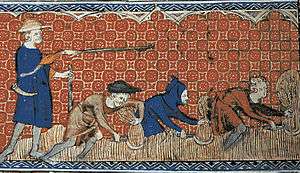Villein
A villein, otherwise known as cottar or crofter, is a serf tied to the land in the feudal system. Villeins had more rights and social status than those in slavery, but were under a number of legal restrictions which differentiated them from the freeman.
Etymology
Villein was a term used in the feudal system to denote a peasant (tenant farmer) who was legally tied to a lord of the manor – a villein in gross – or in the case of a villein regardant to a manor.[1] Villeins occupied the social space between a free peasant (or "freeman") and a slave. The majority of medieval European peasants were villeins. An alternative term is serf, from the Latin servus, meaning "slave". A villein was thus a bonded tenant, so he could not leave the land without the landowner's consent.
The term derives from Late Latin villanus, meaning a man employed at a Roman villa rustica, or large agricultural estate. The system of tied serfdom originates from a decree issued by the late Roman Emperor Diocletian (ruled 284–305) in an attempt to prevent the flight of peasants from the land and the consequent decline in food production. The decree obliged peasants to register in their locality and never leave it.
Because of the low social status of villeins, the term became derogatory. In modern French vilain means "ugly" or "naughty". In Italian, Villano means "rude" or "ill-mannered". For the Spanish Villano, the RAE preserves the definition of "neighbour or inhabitant of a village or town", but it also accepts the derogatory use, which is very similar to the English usage. In Modern English, villain means a scoundrel, criminal, or some other lawless member of society.
Villeinage
Villeinage was important and commonplace in Western Europe of the Middle Ages.
Villeins generally rented small homes, with or without land. As part of the contract with their landlord, they were expected to use some of their time to farm the lord's demesne or provide other services, possibly in addition to a rent of money or goods. These services could be very onerous. Villeins might also be required to pay a fine on the marriage of their daughters outside of the manor, the inheritance of a holding by a son, or other circumstances. Villeins were tied to the land and could not move away without their lord's consent.
Villeins typically had to pay special taxes and fines that freemen were exempt from, for example, "filstingpound" (an insurance against corporal punishment) and "leyrwite" (fine for bearing a child outside of wedlock). Merchet was very often used against a villein's petition for freedom, since paying it proved a villein status.
However, except to their own lords, they were free men in the eyes of the law. Villeins were generally able to have their own property, unlike slaves.
Villeinage, as opposed to other forms of serfdom, was most common in Western European feudalism, where land ownership had developed from roots in Roman law.
A variety of kinds of villeinage existed in Western Europe and it is impossible to arrive at a precise definition which satisfies them all. Different times and countries dealt with villeinage in slightly different ways. Some villeins had clearly defined and limited responsibilities to their lords, while others were essentially at their lords' whim.
The array of restrictions and taxes seems harsh and arbitrary to modern minds. However, it makes sense if one views the medieval manor as an economic unit. For instance, the marriage of a daughter away meant the loss of an able-bodied worker to the village.
Villeinage was not always an involuntary arrangement. In the Early Middle Ages, families entered villeinage voluntarily to guarantee land tenure. And while villeins were heavily restricted in what they could do, it was also possible for them to gain manumission. Many villeins were in villeinage because of the land they held, rather than by birth. They could become free men if their lord agreed with them to move them to a different holding.
Villeinage was not a purely exploitative relationship. In the Middle Ages, land guaranteed sustenance and survival; being a villein guaranteed access to land. Landlords rarely evicted villeins, because of the value of their labour, even where legally able to do so. Villeinage was much preferable to being a landless labourer (such as a cotter), a vagabond, or a slave.
Villeinage became progressively less common through the Middle Ages, particularly after the Black Death reduced the rural population and increased the bargaining power of workers. Furthermore, the lords of many manors were willing (for payment) to manumit their villeins. It had largely died out in England by 1500 as a personal status, but land held by villein tenure (unless enfranchised) continued to be held by what was henceforth known as a copyhold tenancy, which was not abolished until 1925. Villeinage continued in France until the revolution in 1789.
See also
References
Notes
- "villein, n.", Oxford English Dictionary (online ed.), Oxford University Press, 2012, retrieved 29 August 2012
External links
- Vinogradoff, Paul (1911). . Encyclopædia Britannica. 28 (11th ed.). pp. 81–84. This has a detailed survey of the state of villeinage from the 11th through to the 15th century.
- Johnson, Arthur (1909). The Disappearance of the Small Landowner. Oxford: The Clarendon Press.
